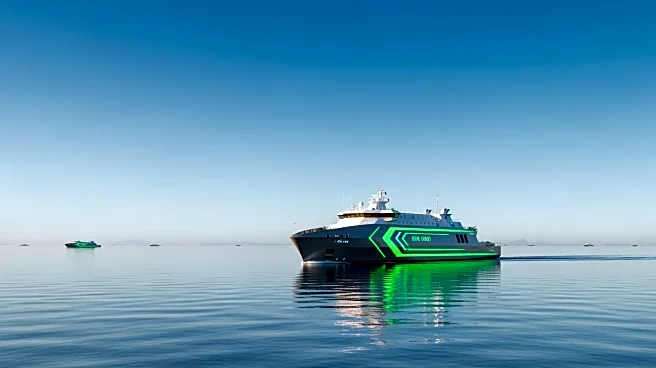What's Happening?
The International Maritime Organization (IMO) is hosting a meeting in London where the world's largest maritime nations are discussing the adoption of new regulations aimed at reducing greenhouse gas emissions from the shipping industry. The proposed
'Net-zero Framework' would establish a marine fuel standard that gradually decreases the allowable emissions from shipping fuels. Additionally, it introduces a pricing system that imposes fees on ships emitting greenhouse gases above set limits, effectively creating the first global tax on such emissions. The Trump administration has expressed strong opposition to the proposal, threatening retaliation if the regulations are supported. The meeting follows an April agreement on the framework's contents, with the goal of formal adoption during this session.
Why It's Important?
The adoption of these regulations could significantly impact the shipping industry, which currently contributes about 3% of global greenhouse gas emissions. By imposing fees on emissions, the framework aims to incentivize the use of cleaner fuels and technologies, potentially generating $11 billion to $13 billion annually for investment in green shipping initiatives. This move could accelerate the industry's transition to net-zero emissions by 2050, aligning with global climate goals. However, the opposition from major countries like the United States and Saudi Arabia highlights the geopolitical challenges in implementing such measures. The outcome of this meeting could set a precedent for international climate action and influence future regulatory approaches in other sectors.
What's Next?
If the regulations are adopted, they will come into force in 2027, with penalties for emissions starting in 2028 for large oceangoing ships. The IMO aims to reach consensus, but a vote may be necessary due to opposition from several countries. The International Chamber of Shipping, representing over 80% of the world's merchant fleet, supports the adoption. The meeting's outcome will determine the pace of decarbonization in shipping, with potential delays if the framework is not approved. Environmental groups are advocating for scalable green alternatives to biofuels, which could play a crucial role in achieving net-zero emissions.
Beyond the Headlines
The proposed regulations raise concerns about the reliance on biofuels, which could lead to deforestation and impact food production. Environmental organizations are urging the IMO to focus on scalable green alternatives like green ammonia and methanol. The framework's success or failure could influence global climate policy and the shipping industry's role in addressing the climate crisis. The meeting's decision will have long-term implications for international trade and environmental sustainability.
















